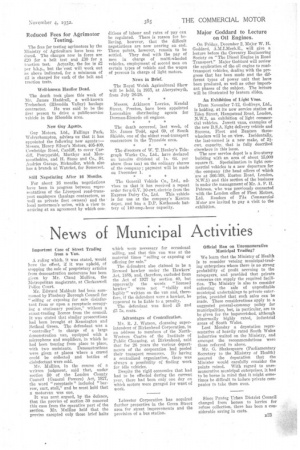News of Municipal Activities
Page 41

If you've noticed an error in this article please click here to report it so we can fix it.
Important Case of Street Trading from a Van.
A ruling which, it was stated, would have the effect, if it was upheld, of stopping the sale of proprietary articles from demonstration motorvans has been given by Mr. Claud Mullins, the Metropolitan magistrate, at Clerkenwell Police Court.
Mr. Edward Mabbutt had been summoned by Finsbury Borough Council for "selling or exposing for sale disinfe,ctent from or upon a receptacle occupying a stationary position," without a street-trading licence from the council. It was stated that similar prosecutions had been brought at Kensington and Bethnal Green. The defendant was a " controller " in charge of a large demonstration van, equipped with a microphone and amplifiers, in which he had been touring from place to place, with two assistants. Demonstrations were given at places where a crowd could be collected and bottles of disinfectant Were sold.
Mr. Mullins, in the coarse of a written judgment, said that, under section 30 of the London County Council (General Powers) Act, 1927, the word " receptacle "• included "barrow, cart, stall,"and be must hold that
motorvan was one.
It was next argued, by the defence, that the proviso of section 30 removed this case from the operative part of the section. Mr. Mullins held that the proviso excepted only those brief halts which were necessary for occasional selling, and that this van was at the material times "selling or exposing or offering for sale," The defendant also claimed to be a licensed hawker nyder the Hawkers' Act, 1888, and, therefore, excluded from the Act of 1927 by section 40, but apparently the words "licensed hawker' were not "visibly and legibly" written on the van and, therefore, if the defendant were a hawker, he appeared to be liable to a penalty.
The defendant was fined 15 and £3 3s. costs.'
Advantages Of Centralization.
Mr. R. J. Watson, cleansing superintendent of Birkenhead Corporation, in an address to members of the NorthWestern Centre of the Institute of Public Cleansing, at Birkenhead, said that for 26 years the various departments of the corporation had pooled their transport resources. By having a centralized organization, there was always a possibility of finding work for idle vehicles.
Despite the rigid economies that had had to be effected during the current year, there had been only one day on which motors were garaged for want of work.
Leicester Corporation has acquired further properties in the Green Street area for street improvements and the provision of a bus station: Official Ban on linretnuneratIve Municipal Trading?
We learn that the Ministry of Health is to consider vetoing municipal-trading enterprises where there is no strong probability of profit accruing to the ratepayers, and provided that private concerns can supply the required facilities. The Ministry is also to consider enforcing the sale of unprofitable municipal undertakings to private enterprise, provided that such sales can be made. These considerations apply to a suggested general-economy policy for municipalities, but, in particular, are to be given for the impoverished, although abnormally highly rated, industrial areas of South Wales.
Last Monday a deputation representative of heavily rated South Wales industries waited on the Ministry, and amongst the recommendations were those referred to above.
Mr. G. Shakespeare (Parliamentary Secretary to the Ministry of Health) assured the deputation that the Minister would carefully consider the points raised. With regard to unremunerative municipal enterprises, it had to be borne in mind that it might sometimes be difficult to induce private companies to take them over.
Since Pan teg Urban District Connell changed from horses to lorries for refuse collection, there has been a considerable saving in costs.




































































































